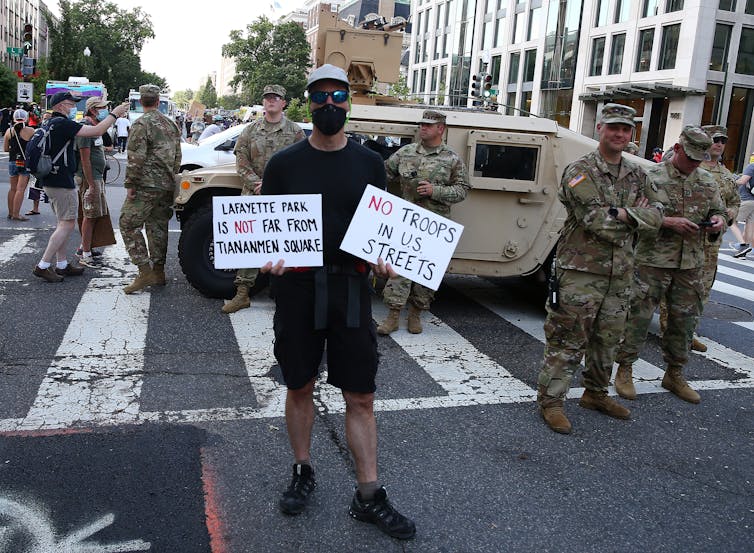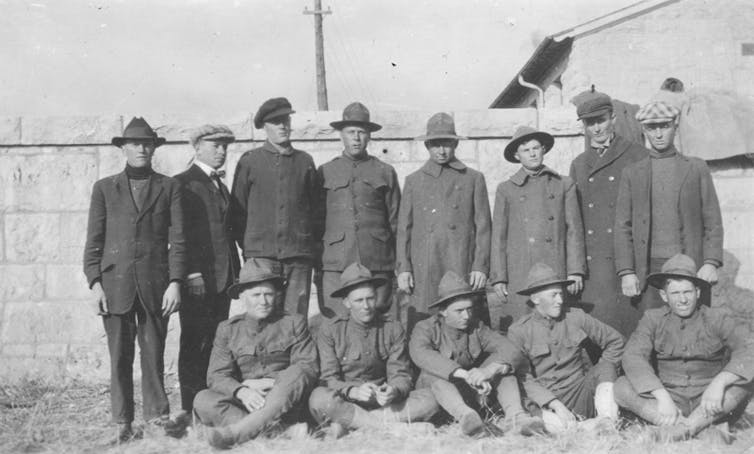Why soldiers can't claim conscientious objection if ordered to suppress protests
- Written by Dwight Stirling, Lecturer in Law, University of Southern California
President Trump’s order that National Guard should “dominate[1]” the streets of Washington, D.C., during recent protests troubled at least a few of the men and women compelled to do the dominating.
Most of the 84,000 Guard members[2] activated in 33 states between May 29 and June 13 escorted ambulances[3] and protected businesses[4] from being damaged. Those in Washington, however, were instructed to use aggressive tactics[5] to clear protesters.
National Guard troops serving in the District dispersed a peaceful demonstration in Lafayette Park[6] by buzzing the crowd with a Black Hawk helicopter and marching in lockstep with police who sprayed demonstrators with rubber bullets and tear gas[7].
One D.C. Guard member later told reporters that, “We didn’t join the military to kill our fellow citizens[8].” Another soldier’s brother was in Lafayette Park at the time[9].
Despite feeling conflicted, National Guardsmen who felt the mission in Lafayette Park violated[10] their personal values and moral code[11] could not have refused to follow the president’s order by claiming conscientious objector status. People with religious or moral objections to war may avoid enlisting as conscientious objectors, and those who experience religious or personal transformations after joining the armed forces may be honorably discharged as conscientious objectors if they request.
But military regulations[12] give members little ability to disobey[13] lawful orders on the grounds of conscience.
Conscientious objector status
As a longtime National Guard JAG officer[14] and a military law professor[15], I have reviewed dozens of conscientious objector applications. These requests to be relieved from duty reveal the intense ethical dilemma that occurs when a superior’s order violates a soldier’s moral or religious code.
For those compelled to fight in violation of deeply held beliefs, the inner wounds[16] are sharp and immediate. The U.S. military’s conscientious objection status is designed to avoid “unnecessary clashes with the dictates of conscience[17].”
 The scene in Washington’s Lafayette Park, June 6, 2020.
Tasos Katopodis/Getty Images[18]
The scene in Washington’s Lafayette Park, June 6, 2020.
Tasos Katopodis/Getty Images[18]
But the right to conscientiously object is afforded only to service members who universally oppose[19] bearing arms – that is, pacifists who believe violence is always wrong, no matter the situation. For those already serving, objections to particular wars or to particular orders to enact violence[20] do not meet the standard no matter how morally offensive[21] service members may find them.
[Deep knowledge, daily. Sign up for The Conversation’s newsletter[22].]
The conscientious objector status has historically been reserved to adherents of pacifist religions. In 1701, William Penn gave Quakers[23] a group exemption from service in the Pennsylvania militia because their religion makes any kind of killing a sin. Mennonites[24] and other nonviolent religious groups have received similar exemptions from military service over the years.
Pacifists in the Civil War could avoid enlisting by paying a fine[25] or providing a substitute to fight on their behalf.
During the Vietnam draft[26] in the 1960s, Congress excused draftees who “by reason of religious training or belief, are conscientiously opposed to participation in war in any form.” The Supreme Court later clarified that one’s conscience can stem from secular values[27], too, if held “with the strength of traditional religious convictions.”
 Mennonite servicemen at Ft. Riley, Kansas, during World War I. Five refused to wear a military uniform, citing conscientious objection to the war.
Mennonite Church USA/Flickr[28]
Mennonite servicemen at Ft. Riley, Kansas, during World War I. Five refused to wear a military uniform, citing conscientious objection to the war.
Mennonite Church USA/Flickr[28]
No excuse for disobedience
The courts have also been clear, however, that occasional conscientious objection[29] doesn’t count as a reason to disobey orders.
In 2002, a Muslim American soldier Sgt. Abdullah Webster refused[30] to deploy in the second Iraq War, claiming[31] a religious scholar had told him serving in the war was against Islamic law. A military court in Virginia convicted[32] Webster of willfully disobeying a direct order by being AWOL.
Soldiers have no “self-help remedy of disobedience” when faced with a legal and constitutional order[33] that they find ethically objectionable, the judge explained[34] in her ruling. Giving soldiers the ability to decide which orders to follow based on their consciences would “undermine the readiness[35] of all units to deploy, and thus compromise the Army’s mission and national security,” she wrote.
Quoting the Supreme Court, the judge said that to do so would “permit every citizen to become a law unto himself[36].”
Following orders is in fact the foundational principle on which effective military organizations are based.
“An army is not a deliberate body,” the Supreme Court observed in 1890 in U.S. v. Grimley[37]. “It is the executive arm. Its law is that of obedience.” Without this rule, commanders would be unable to be successful in combat – or in any activity, really – as soldiers could simply refuse to do as they are told.
Obedience cuts both ways
The military’s rule of obedience[38] applies uniformly regardless of what a soldier’s particular beliefs may be.
Just as the D.C. Guardsmen couldn’t disobey Trump’s order to occupy the capital, soldiers ethically opposed to desegregation, for example, would have been unable to conscientiously object to President Eisenhower’s 1959 order[39] to the National Guard to integrate schools in Little Rock, Arkansas.
This policy ultimately highlights the importance of the president’s own values. As commander in chief, it is the president who tells the military what to do, to whom, and how. If the president’s ethical code broadly diverges from that of most Americans[40], moral offense is more likely to arise among those tasked with obeying his orders.
References
- ^ dominate (abcnews.go.com)
- ^ 84,000 Guard members (www.nationalguard.mil)
- ^ escorted ambulances (www.capradio.org)
- ^ protected businesses (www.cbs8.com)
- ^ aggressive tactics (www.nytimes.com)
- ^ dispersed a peaceful demonstration in Lafayette Park (www.washingtonpost.com)
- ^ tear gas (www.npr.org)
- ^ We didn’t join the military to kill our fellow citizens (www.washingtonpost.com)
- ^ brother was in Lafayette Park at the time (www.politico.com)
- ^ violated (www.nytimes.com)
- ^ personal values and moral code (moralinjuryproject.syr.edu)
- ^ military regulations (books.google.com)
- ^ little ability to disobey (www.cpr.org)
- ^ JAG officer (centerforlaw.org)
- ^ military law professor (gould.usc.edu)
- ^ inner wounds (www.nytimes.com)
- ^ dictates of conscience (scholar.google.com)
- ^ Tasos Katopodis/Getty Images (media.gettyimages.com)
- ^ universally oppose (scholar.google.com)
- ^ particular orders to enact violence (cite.case.law)
- ^ morally offensive (centeronconscience.org)
- ^ Sign up for The Conversation’s newsletter (theconversation.com)
- ^ William Penn gave Quakers (www.encyclopedia.com)
- ^ Mennonites (www.swarthmore.edu)
- ^ paying a fine (www.abraham-lincoln-history.org)
- ^ Vietnam draft (chicagounbound.uchicago.edu)
- ^ secular values (supreme.justia.com)
- ^ Mennonite Church USA/Flickr (flic.kr)
- ^ occasional conscientious objection (cite.case.law)
- ^ refused (cite.case.law)
- ^ claiming (cite.case.law)
- ^ convicted (cite.case.law)
- ^ and constitutional order (theconversation.com)
- ^ judge explained (cite.case.law)
- ^ undermine the readiness (cite.case.law)
- ^ law unto himself (billofrightsinstitute.org)
- ^ U.S. v. Grimley (caselaw.findlaw.com)
- ^ rule of obedience (supreme.justia.com)
- ^ President Eisenhower’s 1959 order (www.history.com)
- ^ broadly diverges from that of most Americans (www.pewforum.org)
Authors: Dwight Stirling, Lecturer in Law, University of Southern California

